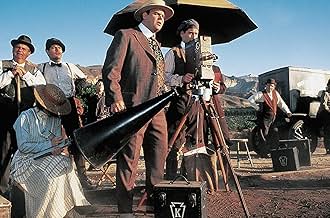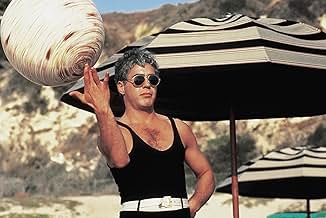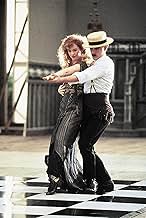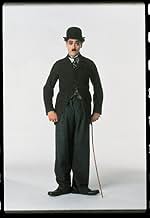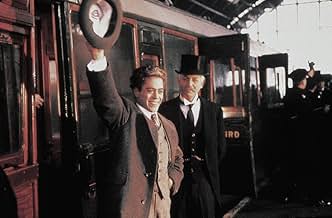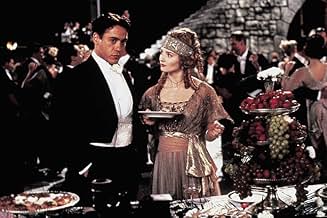CALIFICACIÓN DE IMDb
7.5/10
65 k
TU CALIFICACIÓN
Una película sobre la controvertida y difícil vida del máster de la comedia Charlie Chaplin.Una película sobre la controvertida y difícil vida del máster de la comedia Charlie Chaplin.Una película sobre la controvertida y difícil vida del máster de la comedia Charlie Chaplin.
- Dirección
- Guionistas
- Elenco
- Nominado a 3 premios Óscar
- 3 premios ganados y 20 nominaciones en total
Deborah Moore
- Lita Grey
- (as Deborah Maria Moore)
Opiniones destacadas
This film is beautiful and intelligent, if a little ambitious and overlong (2 and a quarter hours). But it is so worth seeing, for the superb Oscar-nominated performance from Robert Downey Junior. The film starts off flawlessly, with beautiful incidental music from John Barry, and a fantastic performance from Geraldine Chaplin, who played her own grandmother.
We also see Fred Karno, robustly played by John Thaw, and Hetty , played by Moira Kelly(who did struggle with the accent). A standout from the supporting cast, was a lively performance from Kevin Kline, who brought some great energy into the role of Douglas Fairbanks. The performances in general are very good indeed, and the film looks ravishing with show stopping costumes and scenery.
However, it is after the death of Fairbanks, that the film starts to drag, and the title characters rapidly turn into a series of vignettes. As much a great actor Anthony Hopkins is, his turn as the fictional autobiographer was perhaps unnecessary. And I was a bit confused why they turned Hoover as a villain who wanted Chaplin out of the country. The ending is poignant, and Moira Kelly does better in her role as Oona.
The end credits were very educational, and the arrangement of Smile was one of my highlights of this beautifully made but ambitious film. Worth watching for those who are a fan of Richard Attenborough (the director) 8/10 Bethany cox
We also see Fred Karno, robustly played by John Thaw, and Hetty , played by Moira Kelly(who did struggle with the accent). A standout from the supporting cast, was a lively performance from Kevin Kline, who brought some great energy into the role of Douglas Fairbanks. The performances in general are very good indeed, and the film looks ravishing with show stopping costumes and scenery.
However, it is after the death of Fairbanks, that the film starts to drag, and the title characters rapidly turn into a series of vignettes. As much a great actor Anthony Hopkins is, his turn as the fictional autobiographer was perhaps unnecessary. And I was a bit confused why they turned Hoover as a villain who wanted Chaplin out of the country. The ending is poignant, and Moira Kelly does better in her role as Oona.
The end credits were very educational, and the arrangement of Smile was one of my highlights of this beautifully made but ambitious film. Worth watching for those who are a fan of Richard Attenborough (the director) 8/10 Bethany cox
The first thing one should know about "Chaplin" is that, paradoxically, very little of it has to do with Chaplin. Or, at least, it has more to do with the writers' illusions of him. The film claims to be based on "My Autobiography" and on "Chaplin: His Life and Art", by David Robinson. Having re-read the Autobiography before watching the film, it is clear to me that what the writers did was take basic incidents from the autobiography and embellish them with, I can only assume, parts of the Robinson book. What results is a series of scenes which were vaguely influenced by the facts, but so simplified and primitive that little of the original truth remains.
What the writers did not wish to acknowledge was that when Chaplin wrote vaguely or skimmed past certain parts of his life, he really didn't want anyone to delve into them - and the filmmakers did just that. "Chaplin" is not really about Charlie Chaplin, his work and films. It is simply ceaseless speculation on his personal life, but going on even more vaguely about it than the Autobiography.
I am well aware that almost every biopic focuses more on the personal life of a person than on their work. The problem is that most of the characters in "Chaplin" are so exaggerated and simplified that they become almost completely unbelievable - both as the real people AND as fictional characters. None of them are fully developed. This is not entirely the fault of the supporting cast (although it really is not that interesting): the fault lies with the screenplay, which is too often bland and melodramatic. This is especially obvious in the ridiculous subplot concerning the older Chaplin and his editor, which is the most pointless and badly done part of the film; even Hopkins cannot make the lines sound credible, which is all the proof anyone needs of their mediocrity. The film would have worked immeasurably better without these additions.
Many of the most interesting aspects and parts of Chaplin's life are completely ignored, oddly, with seemingly irrelevant or less important stories added in for little reason. One scene in particular is added only to insert a Chaplin-esquire physical comedy sequence which falls flat. The writers greatly accentuated everything to do with Hetty Kelly, even making the same actress play Oona O'Neill; the tried too hard to give him some kind of motive for his relationships, which only leads to more bias and speculation; and although I am by no means a Chaplin purist or even a very knowledgeable admirer, the blatant alterations on the actual history grated on my nerves.
All this being said, the film is certainly not a terrible one. Mainly, however, this is for one reason only, and that is - yes - Robert Downey Jr. himself. The praise he received for the role is by no means undeserved. As Chaplin he is perfect, managing to make the best out of his rather predictable lines, remaining interesting, believable, and in many parts moving. He has wonderful timing and intensity, and even looks the part (he could even do the roll dance). I really quite believed he was Chaplin. Even his performance, however, suffers greatly because of the lines - and the flash-forwards. I have no doubt that he could have played an even better Charlie Chaplin in a differently made film.
The greatest scene in "Chaplin", I think, is the opening credits: Charlie arrives in his dressing room, alone, sits, and begins to remove his make-up. The scene is in black and white, and there is no dialogue - only music. Every emotion is expressed simply through his eyes. If the rest of the film had been made like this, I actually think it could have been perfect. Either way, the lead performance is astounding, the music is beautiful, and though not very insightful or too true to history, this film is well worth watching.
What the writers did not wish to acknowledge was that when Chaplin wrote vaguely or skimmed past certain parts of his life, he really didn't want anyone to delve into them - and the filmmakers did just that. "Chaplin" is not really about Charlie Chaplin, his work and films. It is simply ceaseless speculation on his personal life, but going on even more vaguely about it than the Autobiography.
I am well aware that almost every biopic focuses more on the personal life of a person than on their work. The problem is that most of the characters in "Chaplin" are so exaggerated and simplified that they become almost completely unbelievable - both as the real people AND as fictional characters. None of them are fully developed. This is not entirely the fault of the supporting cast (although it really is not that interesting): the fault lies with the screenplay, which is too often bland and melodramatic. This is especially obvious in the ridiculous subplot concerning the older Chaplin and his editor, which is the most pointless and badly done part of the film; even Hopkins cannot make the lines sound credible, which is all the proof anyone needs of their mediocrity. The film would have worked immeasurably better without these additions.
Many of the most interesting aspects and parts of Chaplin's life are completely ignored, oddly, with seemingly irrelevant or less important stories added in for little reason. One scene in particular is added only to insert a Chaplin-esquire physical comedy sequence which falls flat. The writers greatly accentuated everything to do with Hetty Kelly, even making the same actress play Oona O'Neill; the tried too hard to give him some kind of motive for his relationships, which only leads to more bias and speculation; and although I am by no means a Chaplin purist or even a very knowledgeable admirer, the blatant alterations on the actual history grated on my nerves.
All this being said, the film is certainly not a terrible one. Mainly, however, this is for one reason only, and that is - yes - Robert Downey Jr. himself. The praise he received for the role is by no means undeserved. As Chaplin he is perfect, managing to make the best out of his rather predictable lines, remaining interesting, believable, and in many parts moving. He has wonderful timing and intensity, and even looks the part (he could even do the roll dance). I really quite believed he was Chaplin. Even his performance, however, suffers greatly because of the lines - and the flash-forwards. I have no doubt that he could have played an even better Charlie Chaplin in a differently made film.
The greatest scene in "Chaplin", I think, is the opening credits: Charlie arrives in his dressing room, alone, sits, and begins to remove his make-up. The scene is in black and white, and there is no dialogue - only music. Every emotion is expressed simply through his eyes. If the rest of the film had been made like this, I actually think it could have been perfect. Either way, the lead performance is astounding, the music is beautiful, and though not very insightful or too true to history, this film is well worth watching.
Robert Downey, Jr. gives another one of his splendid performances, Kevin Kline is perfectly cast as Fairbanks, and most of the direction is superb. However, the story hops around a few too many times, and the scenes with Anthony Hopkins are weak and obviously placed in order to clarify things to non- Chaplin fans who watch the film. Overall it is enjoyable, especially the parts when we see him creating his well- known masterpieces. Recommended especially for movie fans, and most especially for Chaplin fans.
Thankyou to Richard Attenborough for this film. I watched it many a time and enjoyed both the biographical aspect and the comedic one but it has also increased my interest in silent comics of this great era.
The film begins by exploring the early life of Charlie, his Brother Sid and his Mother as they try to scrape a living. Thankfully Attenborough doesn't concentrate too much on this deprived part of Chaplin's life. However it does reveal interesting facts about Charlie that he never forgot during his rise to superstardom.
Although Chaplin is played by younger actors at the begining it is the arrival of Robert Downey Jnr which Chaplin fans will anticipate the most. He puts in an amazing performance, his London accent is excellent and ability to do slapstick even better he also really makes you believe that the great man is alive and on the screen again.
The film rightly concentrates on the private life of Chaplin and the development of the cinema. Whilst others may want to see the film concentrate on Chaplin's great pictures e.g The Kid, Gold Rush, and the Great dictator Attenborough blends the creation of these films into specific turning points in Charlie's life. For example Modern times is used to show Chaplin's sympathy towards victims of the wall street crash, as he knew what it was like to be extremely poor. His Jewish connections are also highlighted by the Great dictator, which shows his sensitivities to the European Jews were more at heart than just a making a heap of cash by having a laugh at Hitler's moustache and goose stepping troops.
The film doesn't get bogged down by Chaplin's hectic love life, as Dickie explores Charlie's political beliefs and how J Edgar Hoover was convinced of he was a communist party member. By doing so it shows how Hoover was one of the most twisted individuals to hold public office, with a dangerous obsession on peoples private lives and background.
The film does a good job in showing how important silent stars were and how we should not forget that they were the true greats when films were developing all the time from shorts to feature length, from silent to sound.
The film begins by exploring the early life of Charlie, his Brother Sid and his Mother as they try to scrape a living. Thankfully Attenborough doesn't concentrate too much on this deprived part of Chaplin's life. However it does reveal interesting facts about Charlie that he never forgot during his rise to superstardom.
Although Chaplin is played by younger actors at the begining it is the arrival of Robert Downey Jnr which Chaplin fans will anticipate the most. He puts in an amazing performance, his London accent is excellent and ability to do slapstick even better he also really makes you believe that the great man is alive and on the screen again.
The film rightly concentrates on the private life of Chaplin and the development of the cinema. Whilst others may want to see the film concentrate on Chaplin's great pictures e.g The Kid, Gold Rush, and the Great dictator Attenborough blends the creation of these films into specific turning points in Charlie's life. For example Modern times is used to show Chaplin's sympathy towards victims of the wall street crash, as he knew what it was like to be extremely poor. His Jewish connections are also highlighted by the Great dictator, which shows his sensitivities to the European Jews were more at heart than just a making a heap of cash by having a laugh at Hitler's moustache and goose stepping troops.
The film doesn't get bogged down by Chaplin's hectic love life, as Dickie explores Charlie's political beliefs and how J Edgar Hoover was convinced of he was a communist party member. By doing so it shows how Hoover was one of the most twisted individuals to hold public office, with a dangerous obsession on peoples private lives and background.
The film does a good job in showing how important silent stars were and how we should not forget that they were the true greats when films were developing all the time from shorts to feature length, from silent to sound.
Chaplin works on many levels, because on the one hand it packs an entertaining epic in to two hours and thirty minutes, but doesn't fail to keep up your interest and comes over as being very enjoyable. Perhaps the problem is that, Chaplins life might not be the most suitable for a MOVIE,purely because his life was so eventful, and might have translated itself better as a TV Mini Series, but for getting the best out of what screen time available and still coming up with some very credible work, you must hand it over to Richard Attenborough and everyone at Carolco. For starters, the movie is simply beautiful to look at. The production design by Stuart Craig [these days of Harry Potter fame] is well tuned with the simply fantastic Cinematography by Sven Nykvist, and this is why the movie works so well, because at the more tedious intermissions the movie has to offer [and there are only a few], the movie is still interesting and prestine to watch. Just as good are Ellen Mirojnick and John Mollo's costumes designs, in fact, Chaplin offers a production so rich that at once i forgot that this was a period film, and felt transported back to the various different time zones the movie had to offer, and this is a good sign of a genius at work. Richard Attenborough did similar wonders with his Ghandi [1982], in my opinion he does it far more interestingly here. The real revelation of the movie is Robert Downey JR as Chaplin. I remember reading in a book entitled The Chaplin Encyclopedia, that hearts sank when an American assumed the role. Well, i cant really understand the kinetics behind this seeing that Chaplin spent 85% of his life away from England and was more of a worldwide Icon than a British spearhead, plus the fact that Americans ARE Good Actors, and Downey JR is one of the very finest. Charlie Chaplin himself was a couple of years before my time, but Downey JR is so fantastic, so realistic in the role that i didn't for one minute doubt the genius of the REAL Chaplin and in fact only became a fan of the little tramp after seeing this Biopic, as though the missing pieces of Chaplins life had come together to complete the jigsaw. Downey JR carries the movie, it is hard to imagine anyone else in the role, he is the right build, height and of simmilar looks and even nails the accent down. He even does The Little Tramp so covincingly that i think that Chaplin himself would have been forced to admit how good he is. This could prove to be Downey JR's best work on screen, but i hope like many other of his admirers that things do go right for him,and he gets on the right track and he is good to himself in future. On a side note i definitely think that Robert was worthy of the Academy Award for best actor for this, but the BAFTA is more than Justified. Hopefully his role in the adaption of Denis Potter's The Singing Detective will be good enough for him to be recognised by the Academy. The only down side to the characterisation awarded to Robert Downey JR in the title role is that the other characters pale in significance. Admitedly it is nice to see the famous faces such as Kevin Kline as Douglas Fairbanks, Diane Lane, Penelope Anne Miller and the Late great John Thaw in a heart rendering cameo as Chaplins great influence Fred Karno. But their characters are so limited that the come a cross as essential but perhaps slightly surplus. More impressive and important are the likes of Dan Ackroyd in an hillarious cameo as Mack Sennet, and the interstingly cast Geraldine Chaplin as her own grandmother Hanna. The fact that Hannah Caplin was mentally ill and the effects it had on Charlie Chaplin are nicely hinted at but in large glossed over. Anthony Hopkins is, it must be said, wasted as the fictional George Hayden. It is however reassuring to see Hopkins, and he himself 15 or so years earlier might have made a good Chaplin himself. Paul Rhys, too is kept in the dark, wich is unfortunate because the character he plays, Chaplins brother sid, was quite a big cog in the Chaplin works [see Modern Times-joke]. The nicest other part is that of Hetty Kelly/Oona Chaplin, Chaplins first and last loves, played by Moira Kelly. Kelly's presence adds a nice touch of grace and gentleness to the movie. Perhaps the real failing of the movie is, like this review, it tries to pack to much in, and like i said this would have been better done as a TV Mini series, or even two movies. These minor quibbles asides, Chaplin boasts an enjoyably epic screenplay by Diana Hawkins, William Boyd, Bryan Forbes and the Legendary William Goldman, based on David Robinsons Chaplin-His Life and Art and My Autobiography by Chaplin Himself. The movie is tightly directed and edited, includes nice trick photography and is very professionaly and well acted, particularly y Robert Downey JR but everyone ivolved does well, no matter the merits of the characterisations. It also has one of the most beautiful, moving musical scores by John Barry, perhaps his best, sadly over looked of scores. If you havent seen the movie, i hope this review helps whet your appetite, because it is a very worthwhile worth seeing movie..........
¿Sabías que…?
- TriviaGeraldine Chaplin played her real-life paternal grandmother Hannah Chaplin.
- ErroresWhen Charlie is shown at the 1972 Oscars near the end of the movie, he is showed being brought to the podium in the wheelchair and then standing at the podium as the movie clips played. In the actual awards ceremony, Charlie walked out to the podium under his own power after the clips ended.
- Citas
German Diplomat: [offering his hand] Mr. Chaplin! I am a great admirer of yours.
Charlie Chaplin: I'm sorry, I prefer not to shake hands with Nazis.
German Diplomat: [laughs nervously] What have you got against us, Mr. Chaplin, hm?
Charlie Chaplin: What have you got against everybody else?
- Créditos curiososThe film ends with the final scene of El circo (1928): Charlie Chaplin walks off into the distance.
- Versiones alternativasTo receive a 12 certificate the original UK cinema version was cut to remove one use of 'fucking' (during Charlie's homecoming visit to a pub). Later releases were uncut and upgraded to a 15 rating.
- ConexionesFeatured in Friday Night: Episode #1.11 (1992)
- Bandas sonorasThe Honeysuckle and The Bee
Written by Albert Fitz and William H. Penn (as William Penn)
Selecciones populares
Inicia sesión para calificar y agrega a la lista de videos para obtener recomendaciones personalizadas
- How long is Chaplin?Con tecnología de Alexa
Detalles
- Fecha de lanzamiento
- Países de origen
- Sitios oficiales
- Idiomas
- También se conoce como
- Charlie
- Locaciones de filmación
- Productoras
- Ver más créditos de la compañía en IMDbPro
Taquilla
- Presupuesto
- USD 31,000,000 (estimado)
- Total en EE. UU. y Canadá
- USD 9,493,259
- Fin de semana de estreno en EE. UU. y Canadá
- USD 84,669
- 27 dic 1992
- Total a nivel mundial
- USD 9,493,259
- Tiempo de ejecución
- 2h 23min(143 min)
- Color
- Relación de aspecto
- 1.85 : 1
Contribuir a esta página
Sugiere una edición o agrega el contenido que falta



